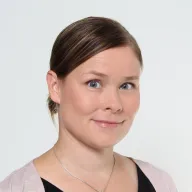Responsible work ability support – TYÖOTE

Objectives
Health care for people of working age is provided in Finland by many operators, and the co-operation may not always work optimally for the best interests of working-age people’s work ability. By improving co-operation between specialist medical care, basic health care and occupational health care, it is possible to make the employee's treatment, rehabilitation and return to work more efficient.
In the TYÖOTE operational model formed in the project, the occupational health care provider takes responsibility for co-ordinating the patient’s treatment in a specialized health care unit or health centre and takes care of the follow-up so that the employee can return to work as soon as possible with full work ability. In this way, the competence of occupational health care in matters of work ability can be utilized more quickly and systematically by public health care than in current practice.
The TYÖOTE model applies to employees covered by occupational health care. The development of a service and rehabilitation system aimed at them will free up public resources for those who lack occupational health care. The functionality of the TYÖOTE operational model will be measured by audits carried out in the project.
Data and methods
In the three-year project, the Finnish Institute of Occupational Health will disseminate the practice used in Central Finland to all Finnish hospital districts. In the operational model, the patient is referred from public health care to occupational health care for active work ability assessments and work ability support measures. With the support of occupational health care, workplaces will also be involved in supporting the employee's rehabilitation. This generic operational model will be tuned to fit the characteristics of each region.
Results and impact
The measures taken in the project will benefit society as a whole.
Employee
- A referral to support work ability can be made regardless of the extent of the patient's occupational health care contract.
- Agreed work ability assessment appointments and controls in occupational health care;
- Individual return to work and necessary support measures in place;
- Reduced risk of permanent incapacity for work.
Hospital
- Focuses on core activities: follow-up of patient care and arrangements for returning to work are agreed upon in occupational health care;
- Physicians at hospitals are usually unfamiliar with the patient's work -> there is also no need to assess longer-term work ability;
- Sick leave of less than two months does not require B statement from a physician at a hospital;
- The hospital receives full support from the developers of the Finnish Institute of Occupational Health for the establishment of a new operational model.
Occupational health care
- Information delivered to occupational health care in time -> sufficient time to schedule and agree upon the assessment of work ability, arrangements for work ability support and returning to work;
- Occupational health care know-how will be used more efficiently;
- Occupational health care receives full support from the developers of the Finnish Institute of Occupational Health for the establishment of a new operational model.
Employer
- Some of the employees return to work earlier than in the old model;
- Reduced need for substitutes;
- Productivity increases.
Society
When an employee with full work ability is able to work:
- Tax revenue increases;
- Sickness costs are reduced;
- Employment rate is improved.
Our experts


Funding and co-operating organizations
The project is co-ordinated by the Ministry of Finance as part of its cost-effectiveness work. The project is managed by the Central Finland Hospital District and funded by the Ministry of Social Affairs and Health.
The Finnish Institute of Occupational Health is responsible for the national dissemination of the operational model and communication of the project.
The quality and functionality of the resulting operational models will be ensured by audits. The project also involves an impact study under the responsibility of the University of Eastern Finland.





